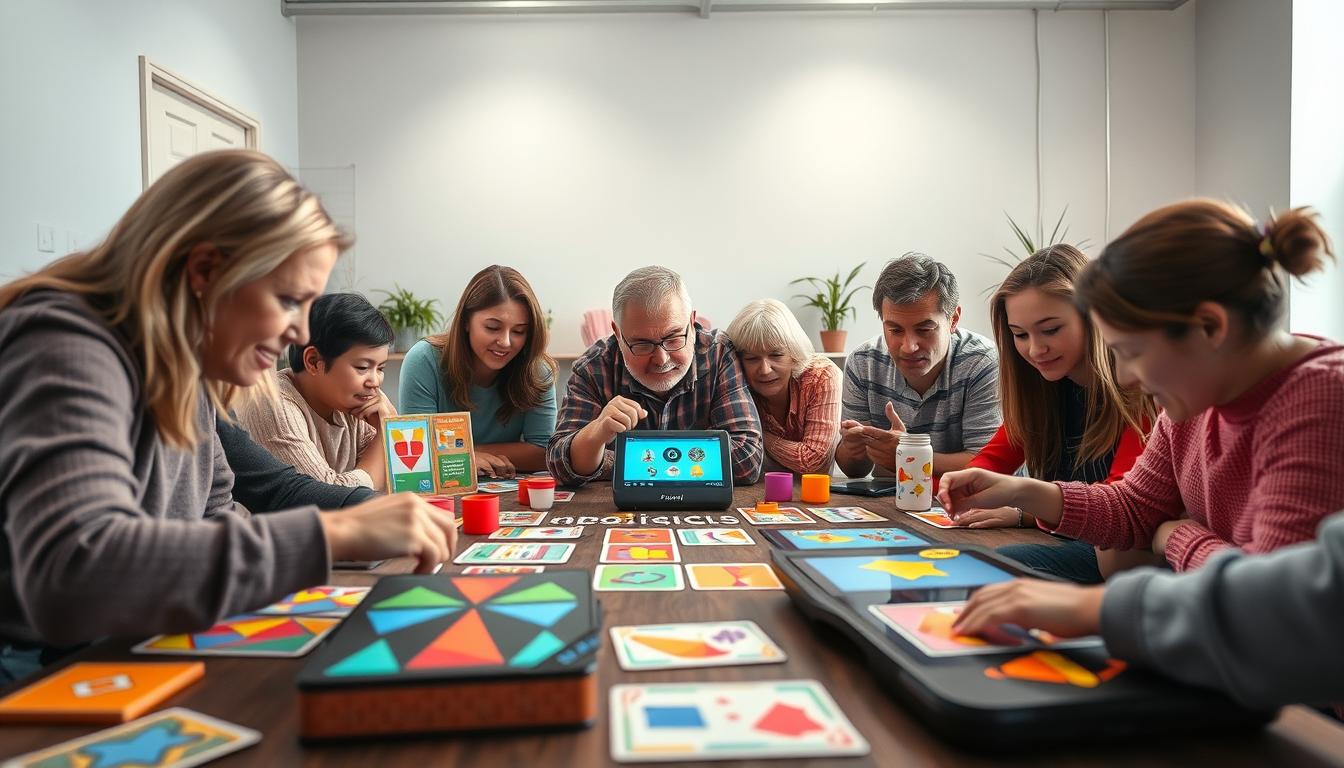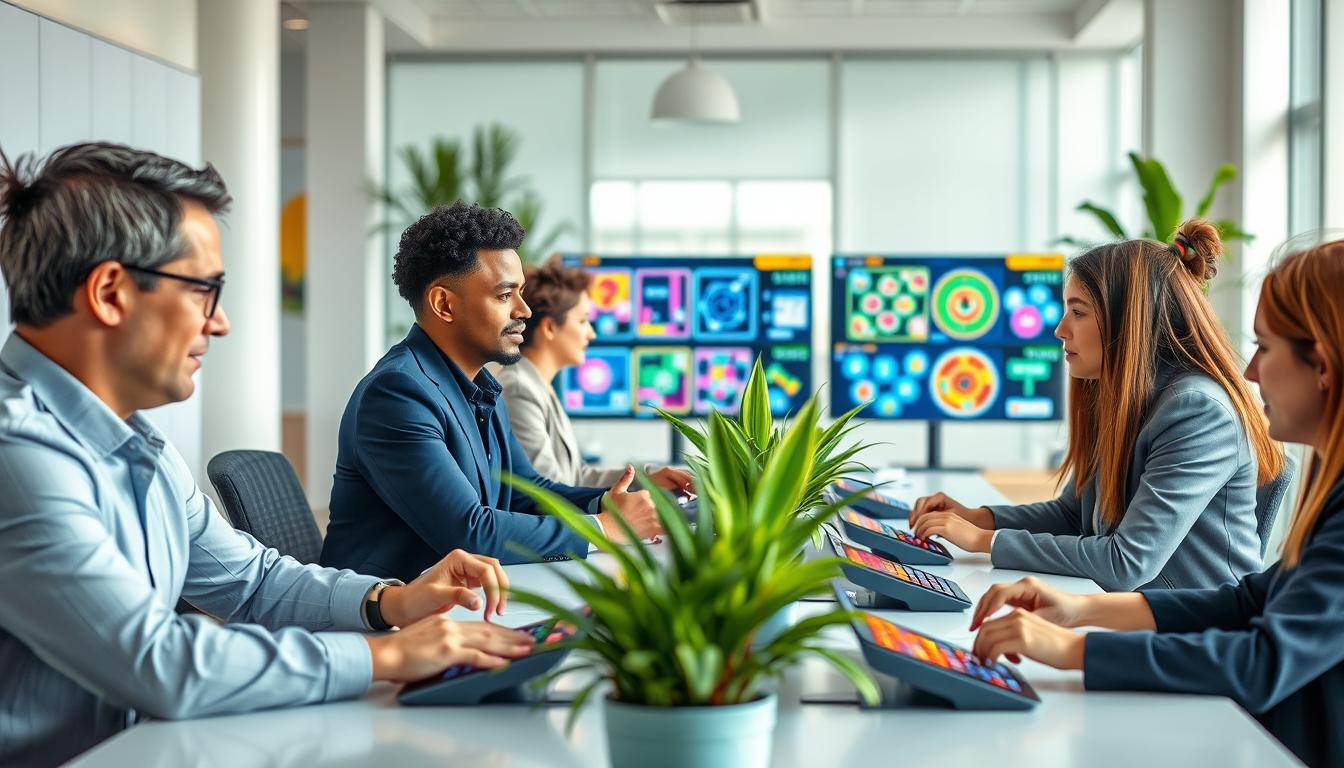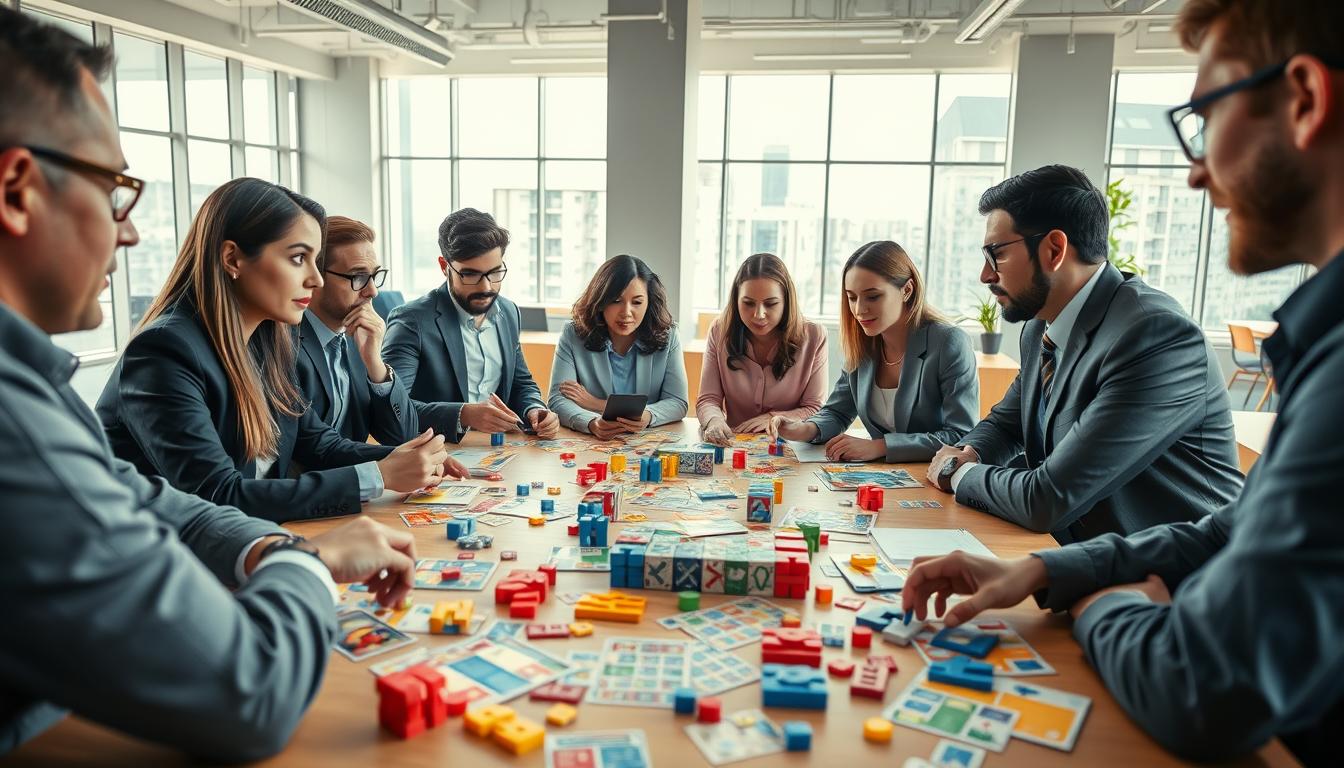Educational games that train adults to remember and execute complex sequences
Have you ever wondered why some adults seem to effortlessly juggle multiple tasks? Others struggle to remember simple sequences. In today’s complex world, educational games are key for both kids and adults. They’re not just fun; they help improve memory and cognitive skills.
These games focus on managing complex tasks. They help adults boost their working memory. This way, they can handle intricate tasks with ease.
Understanding Working Memory and Its Importance
Working memory is key to how we think and learn. It lets us handle and change information in our minds. This mental space is crucial for learning, solving problems, and following directions.
Knowing what working memory does helps us see its role in everyday life. It’s important for many tasks we do every day.
Components of Working Memory
Working memory has several parts that work together:
- Phonological Loop: Deals with words and sounds.
- Visuospatial Sketchpad: Handles visual and spatial info, helping with navigation.
- Central Executive: Controls attention and works with the other parts.
How Working Memory Affects Daily Functioning
Working memory greatly affects how we function daily. A strong working memory helps in school, solving problems, and making decisions. It’s needed for tasks like reading, cooking, and managing money.
These tasks require working memory to work well together. This affects how we process and keep information in our daily lives.
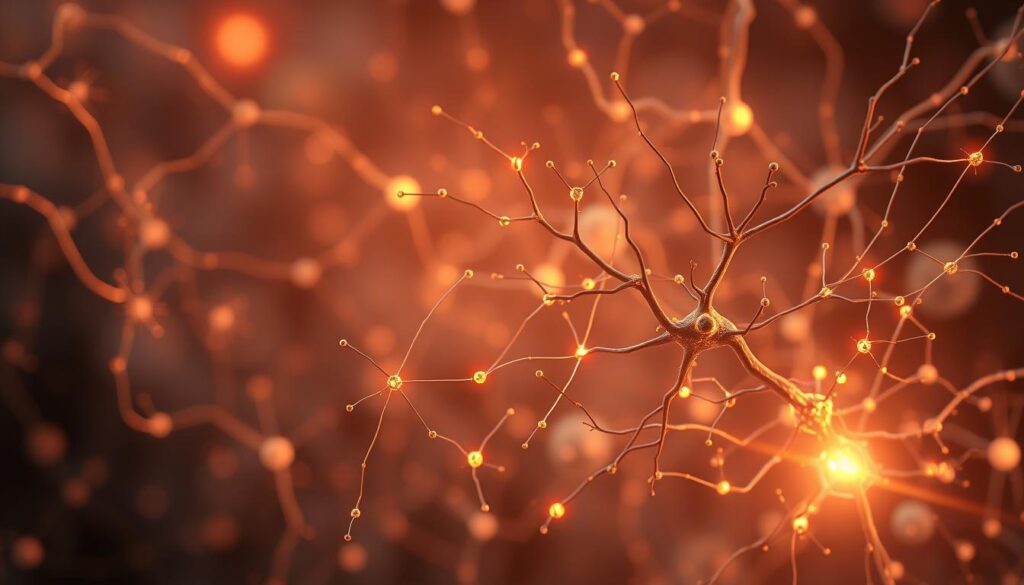
Benefits of Educational Games for Adults
Educational games are great for adults. They make learning fun and interactive. This helps adults understand complex ideas better and remember them longer.
Enhancing Cognitive Skills Through Gameplay
Playing games challenges adults to think critically and solve problems. It boosts their decision-making and how quickly they process information. These skills can improve other areas of their lives too.
Engaging and Retaining Information
Games make learning fun, which helps adults remember what they learn. The interactive nature of games helps solidify knowledge. This makes learning a fun, ongoing process for adults.
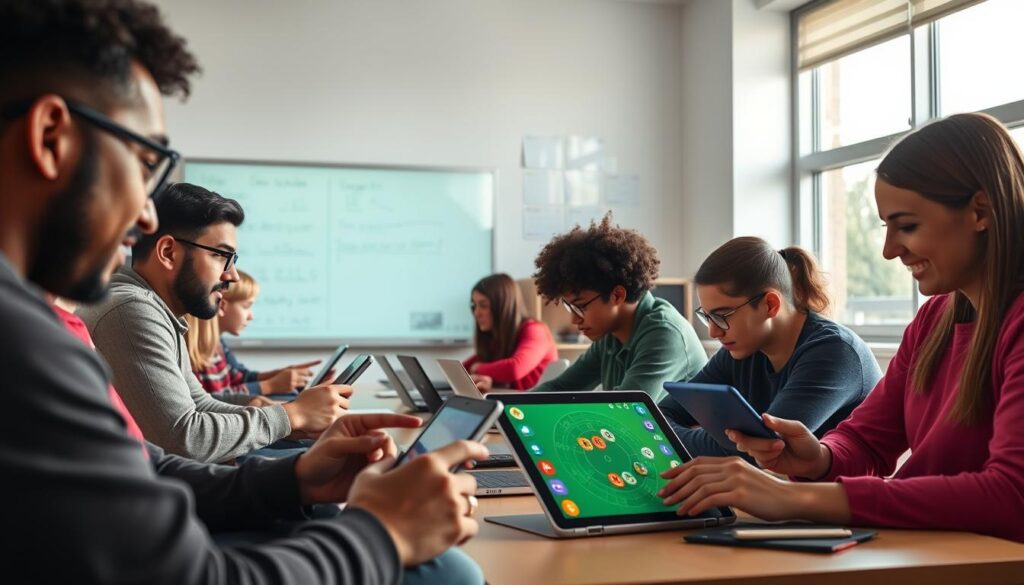
Types of Educational Games for Adults
Playing different educational games can really boost learning for adults. These games are not just fun. They also help improve our thinking skills. Two main types are memory exercises and interactive learning tasks.
Memory Exercises
Memory exercises are a fun way for adults to get better at remembering things. They include word and picture challenges. These games help improve memory through enjoyable activities.
Examples include matching games, remembering sequences, and quick recall tasks. These activities help us think fast and remember better.
Interactive Learning Tasks
Interactive learning is all about working together and getting hands-on. It’s key for adult education. It includes group work, simulations, and learning through scenarios.
These activities make learning fun and help us understand complex topics better. They ensure we can use what we learn in real life.
Brain Games to Improve Multi-Step Task Management
Brain games are great for improving how adults manage tasks. They help with planning, doing, and checking tasks. This makes us better at handling tasks in real life.
Examples of Effective Brain Games
- Dual N-Back Training: This game tests your memory and focus. You have to remember sequences while doing other tasks.
- Memory Puzzles: Puzzles that make you remember shapes, colors, or sequences improve your memory and organization.
- Task Planning Games: These games are like real projects. They help you learn to prioritize tasks based on different factors.
Application in Real-Life Scenarios
Brain games help us in many real-life situations. At work, following complex instructions is key. These skills help with managing projects, coordinating activities, or multitasking daily.
Using these skills makes us more efficient and effective in our daily lives.
The Role of Dual N-Back Training
Dual n-back training is a powerful way to improve working memory. It involves remembering sequences of visual and auditory cues. This keeps your mind sharp and boosts your memory skills.
By doing this training often, you get better at handling many tasks at once. This skill is useful in daily life.
Overview of Dual N-Back Exercises
In dual n-back exercises, you remember both visual and auditory cues at the same time. This makes you more engaged in your thinking. As you get better, your brain gets stronger, improving your memory.
Research Findings on Its Effectiveness
Many studies show that dual n-back training works well for improving working memory. People who do these exercises regularly can remember more when faced with complex tasks. This can help them do better in school, work, and personal life.
Chunking Information for Better Retention
The chunking method is a great way to improve memory. It breaks down hard information into easy-to-handle pieces. This makes it easier to remember and understand.
In schools, it helps students learn and remember better. It’s all about getting a deeper grasp of what’s being taught.
Understanding the Chunking Method
The chunking method uses the brain’s natural way of organizing info. Instead of remembering a long list, it’s better to group items. This makes remembering easier.
Games use this method to help players learn. They make it easier to organize and remember information.
Practical Applications in Games
Educational games often use the chunking method. They break down info into smaller parts. This makes it easier to focus and learn.
For example, games might group words, events, or formulas. This helps players remember better and enjoy the game more.
Meditation and Mindfulness Techniques
Meditation and mindfulness help a lot with focus, which is key in learning. They help people concentrate better and ignore distractions. These practices also boost how well we learn and understand new things.
How Meditation Enhances Focus
Meditation makes us calm and clear-headed, helping us focus better. It builds mental strength over time. Studies show that our brains get better at staying focused as we get more mindful.
Incorporating Mindfulness into Learning Games
Learning games with mindfulness make learning fun and interactive. They help us stay focused and remember things better. By making games that focus on attention, developers create tools that really help adults learn.
| Technique | Description | Benefits |
|---|---|---|
| Meditation | A practice involving focused attention and awareness. | Improves overall concentration and reduces stress. |
| Mindfulness | A method of being present in the moment without judgment. | Enhances cognitive flexibility and emotional regulation. |
| Mindful Learning Games | Interactive games designed to promote mindfulness. | Encourages focus, retention, and cognitive engagement. |
The Impact of Visualization in Learning
Visualization is key in making learning better. It lets people create mental pictures and links to what they’re learning. Techniques like mental mapping and storytelling help a lot. They make learning stick and easier to understand.
Engaging with Mental Mapping
Mental mapping is a great way to organize information visually. It lets learners see how things relate to each other. This makes hard stuff easier to get.
It also helps learners remember things better. They can recall information more easily.
Storytelling as a Learning Tool
Storytelling makes learning fun and relatable. It wraps facts and concepts in stories. This way, learners connect better with the material.
It also helps them remember things longer. Using stories in educational games makes learning fun and memorable.
Listening to Music and Cognitive Performance
Music and learning are now more connected in schools. Studies show that music, especially classical, helps students focus better. It makes learning easier by creating a calm atmosphere.
The Benefits of Classical Music for Focus
Classical music boosts brain activity, helping with complex tasks. Its rhythms and harmonies help learners stay focused. This makes educational games more effective in improving memory.
Incorporating Music into Educational Settings
Schools can use music in their lessons. Playing classical music during study or games makes learning more effective. It helps students stay focused and improves their overall learning skills.
Role of Worksheets in Memory Practice
Memory worksheets are key for adults wanting to boost their memory skills. They offer practical exercises that help improve memorization. These worksheets are designed for different learning styles and strengthen our brains.
Different Types of Memory Worksheets
There are many types of memory worksheets to meet various needs. Some popular ones include:
- Recall Exercises: These focus on simple tasks to improve basic memory.
- Sequential Tasks: They help strengthen the ability to remember and follow complex sequences.
- Matching Games: These games connect items or concepts, enhancing our ability to think associatively.
- Scenario-Based Exercises: These reflect real-life situations, helping us apply what we’ve learned in practical ways.
Benefits of Off-Screen Practice
Using memory worksheets for off-screen practice has many benefits. It reduces distractions found in digital spaces, allowing for better focus. When adults practice memorization techniques on paper, they often see:
- Improved retention rates, as writing helps solidify learning.
- Increased focus, without digital distractions.
- Enhanced cognitive engagement, leading to better understanding and application of information.
Creating an Ideal Learning Environment
An effective learning environment helps people grow and learn. For adults, a space that encourages active participation is key. This approach boosts cognitive skills and helps retain information in meaningful ways.
By using interactive strategies, educational programs can turn classrooms into lively centers of adult education.
Importance of Active Participation
Active participation lets adults take charge of their learning. By engaging with the material through discussions, games, and practical applications, learners connect concepts to real life. This connection boosts motivation and keeps interest alive.
Seeing their contributions valued in a collaborative setting also improves information absorption.
Furthermore, a supportive learning environment fosters critical thinking. Participants who share their opinions and experiences develop analytical skills. These skills are crucial in both personal and professional life.
The mix of active involvement and a well-structured learning space lays the groundwork for lifelong learning among adults.
Balancing Informational Sharing with Experiential Activities
It’s important to mix sharing information with hands-on learning for adult training. This mix helps learners use what they learn in real-life situations. It makes them understand and master skills better.
By adding interactive parts to learning, programs can boost thinking skills and keep information in mind longer.
Differentiating Between Passive and Active Learning
Passive learning, like lectures and reading, doesn’t involve much talking between teachers and students. It can make learning feel dull and shallow. On the other hand, active learning gets people involved through talks, solving problems, and doing things themselves.
This hands-on approach makes learning stick better and is more fun.
- Active participation in learning activities boosts thinking and teamwork among learners.
- Experiential learning helps adults by showing how knowledge works in everyday life, making it easier to grasp.
- Using games in learning keeps things interesting and lets people practice and improve skills in a fun way.
By balancing sharing information with doing things, learning becomes more lively. It supports different ways of learning and helps adults succeed in their studies.
Using Training Games to Optimize Adult Learning
Training games are key in adult learning. They make learning fun and interactive. This helps adults get involved and learn better than usual methods.
These games make learning hands-on and fun. Adults like to learn by doing and working together. This approach boosts their motivation and understanding.
Methods for Engaging Adults in Training
- Collaboration: Encourage group activities where learners share ideas and solutions, enhancing social interaction.
- Real-World Scenarios: Integrate case studies or simulations that reflect real-life challenges, making the learning relevant.
- Feedback Mechanisms: Promote instant feedback during training games to help adults gauge their understanding and progress.
- Gamification: Utilize points, badges, or levels to create enjoyable competition among participants, increasing motivation and engagement.
Understanding Cognitive Experiential Self-Theory (CEST)
Cognitive experiential self-theory looks at how we learn in two main ways: analytical and intuitive learning. It shows how thinking and feeling work together to help us understand and remember things. Knowing this helps create better ways to teach that fit different learning styles.
Interplay of Analytical and Intuitive Learning
Analytical learning uses logic and structure to break down information. It helps learners solve problems and think critically. On the other hand, intuitive learning uses feelings and personal experiences to guide us. It doesn’t rely on logical thinking.
Games can use both learning styles to make learning fun and engaging. By using cognitive experiential self-theory in game design, developers can reach more learners. This way, everyone can learn and use what they know in real life. Using both styles makes learning more meaningful and effective.
Conclusion
Educational games are key for adults to boost their brain skills, especially in remembering and doing complex tasks. These games make learning fun and help improve memory and other brain functions. They are essential for everyday life.
Using methods like dual n-back training and chunking, people can strengthen their memory. Adults who play these games can handle more complex tasks and work better. This shows why educational games are important for adult learning and growth.
Playing these games helps adults keep learning and growing. It’s about always wanting to get better and explore new things. This way, adults can not only remember important stuff but also succeed in their personal and work lives.
FAQ
What are educational games?
Educational games are designed to make learning fun. They help improve skills like memory and decision-making. This makes learning complex ideas easier for adults.
How do educational games enhance working memory?
Educational games boost working memory by making players think hard. This helps them remember things better. It also helps them handle tasks that need several steps.
What types of educational games are best for adults?
For adults, games that test memory and interactive tasks are great. They match different learning styles. This makes learning more fun and effective.
What is dual n-back training?
Dual n-back training is a brain exercise. It makes you remember sequences of sounds and pictures. It helps improve how well you manage tasks in real life.
How can chunking information improve memory retention?
Chunking breaks down information into smaller parts. This makes it easier to remember. Educational games use this method to help players organize information better.
Can mindfulness techniques improve cognitive performance?
Yes, mindfulness and meditation can improve focus and attention. These skills are key for better working memory. Educational games can include these practices to enhance learning.
What role does visualization play in learning?
Visualization helps by creating mental pictures of concepts. This makes learning easier and helps retain information better. It’s used in games and real-life learning.
How does listening to music affect learning?
Classical music can improve focus and cognitive performance. Adding music to educational games can make learning more engaging. This can lead to better retention and task execution.
Are memory worksheets beneficial for adults?
Yes, memory worksheets help adults practice without distractions. They offer simple to complex exercises. This boosts retention and reinforces skills learned from digital games.
What makes an ideal learning environment?
An ideal learning environment encourages active participation. Educational games that require interaction can greatly improve learning outcomes. This leads to better retention among adult learners.
What is the difference between passive and active learning?
Passive learning is just listening or reading without doing much. Active learning involves doing and applying what you learn. This leads to better skills and retention through hands-on experiences.
How do training games optimize adult learning?
Training games engage adults and help them apply new knowledge right away. They fit well with adult learning preferences. This makes learning outcomes better within a curriculum.
What is Cognitive Experiential Self-Theory (CEST)?
CEST says we learn through rational thinking and experience. Knowing this helps create learning experiences that fit different learning styles. This makes learning more effective.
